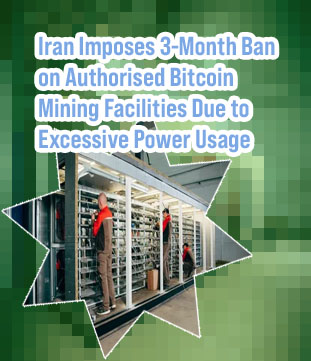


The Iranian government's involvement in massive Bitcoin mining operations has raised concerns and sparked discussions in the cryptocurrency community. To better understand the implications of this situation, we have curated a list of three articles that delve into the topic from different perspectives.

Iran has been steadily increasing its presence in the global Bitcoin mining industry, taking advantage of cheap electricity costs and government subsidies. This has allowed Iranian miners to compete on a global scale, contributing to the overall network hash rate of Bitcoin.
One practical use case of Iran's growing influence in Bitcoin mining can be seen in the positive impact it has had on the country's economy. With the cryptocurrency market booming, Iranian miners have been able to generate significant profits, providing much-needed revenue for the country. This has helped to offset some of the economic challenges that Iran has been facing due to international sanctions.
Iran's increasing influence in the global Bitcoin mining industry has also been met with some skepticism and concern from other countries. Some worry about the potential for Iran to use Bitcoin for illicit activities or to circumvent sanctions. However, Iran has stated that its mining activities are in compliance with international regulations and that it is simply taking advantage of a lucrative opportunity.
Overall, Iran's growing influence in the global Bitcoin mining industry is a testament to the country's entrepreneurial spirit and ability to adapt to new technologies. While there are challenges and risks involved, the potential benefits for Iran's economy are significant.
Bitcoin mining in Iran has been on the rise in recent years, driven by factors such as cheap electricity prices and government subsidies. However, the environmental impact of this activity has raised concerns among experts and environmentalists.
Energy Consumption: Bitcoin mining requires a significant amount of energy to operate the specialized computers needed to solve complex mathematical puzzles. In Iran, where electricity is heavily subsidized, miners have been able to take advantage of low-cost power to increase their mining operations. This has led to a surge in energy consumption, putting a strain on the country's power grid.
Carbon Emissions: The energy-intensive nature of Bitcoin mining in Iran has also resulted in a significant increase in carbon emissions. The electricity used in mining operations is often generated from fossil fuels, such as natural gas and oil, which release greenhouse gases into the atmosphere. This has raised concerns about the impact of Bitcoin mining on Iran's efforts to reduce its carbon footprint.
Environmental Degradation: The large-scale mining operations in Iran have also led to environmental degradation in the form of air and water pollution. The burning of fossil fuels for electricity generation has contributed to poor air quality, while the disposal of electronic waste from outdated mining equipment has contaminated water sources.
Pressure on Resources: The rapid expansion of
In a recent discussion with experts in the cryptocurrency industry, the spotlight was on the regulatory hurdles confronting the Iranian government in relation to Bitcoin mining operations. The experts shed light on the complex web of challenges that the government faces in attempting to regulate this booming industry.
One of the key issues highlighted was the ambiguity surrounding the legal status of Bitcoin mining in Iran. The lack of clear guidelines and regulations has created a sense of uncertainty among miners and investors, leading to potential risks and vulnerabilities in the market. Additionally, the experts pointed out the difficulties in enforcing regulations due to the decentralized nature of Bitcoin and the anonymity it offers to users.
Furthermore, the discussion touched upon the impact of international sanctions on Iran's ability to fully capitalize on the potential of Bitcoin mining. The restrictions imposed by foreign powers have limited Iran's access to crucial resources and technologies, hindering its ability to compete on a global scale.
This discussion underscores the importance of establishing clear and comprehensive regulations for Bitcoin mining operations in Iran. Without proper oversight and guidance, the industry risks facing further challenges and setbacks in the future. It is crucial for the Iranian government to address these regulatory issues in order to foster a healthy and sustainable environment for cryptocurrency development and investment.